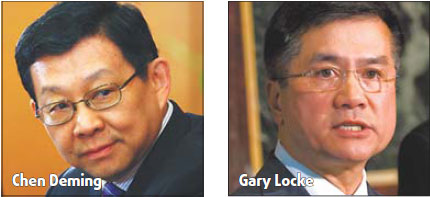
|
BIZCHINA> Top Biz News
 |
|
US and China: 'no protectionism'
By Cai Hong (China Daily)
Updated: 2009-05-04 07:42
 Top Chinese and United States officials have agreed to avoid setting up trade barriers between the two countries to cope with the economic downturn despite what some see as their apparent benefits. It comes as the two countries signed 32 trade agreements, worth $10.6 billion and boosting both countries' economies. "The deeper this economic crisis becomes, the more open we should be," said Chinese Commerce Minister Chen Deming, who visited the American capital and Chicago last week.
China is the second largest trade partner with the US while the US is China's largest. China sent three trade missions to the US as its commerce minister acquainted himself with US Secretary of Commerce Gary Locke, US Trade Representative Ron Kirk and Lawrence Henry Summers, director of the White House's National Economic Council for US President Barack Obama. China said it was sincere about improving its economic relations with the US. The 150 business executives from the three Chinese trade delegations signed 32 contracts with their US business partners, worth $10.6 billion, which the US Chamber of Commerce said would help create jobs in the US and boost the economy. The US companies that signed the business deals were Alcatel-Lucent, Amway, Cisco, Dell, Emerson, EMC, Ford, Freescale, Hewlett-Packard, Hitachi Global Storage Technologies, IBM, Juniper, Microsoft, Motorola, Oracle, Revstone Industries, Seagate, The Shaw Group, Sun Microsystems, Western Digital, and Westinghouse. In the first three months of this year, Sino-US trade declined by 15.5 percent compared with the same period last year. US investment in China accounted for only 2.6 percent of foreign investment in the country, a drop from 3.2 percent. "With businesses in both countries struggling, these deals come at a critical time and will help create jobs and stronger commercial bonds between the United States and China," said US Chamber of Commerce senior vice-president of international affairs, Myron Brilliant. Yao Wenping, vice-president of China Chamber of Commerce for Import and Export of Machinery and Electronic Products, warned that protectionism is being felt throughout the world. "Protectionism is taking place in 17 of the G20 countries," Yao said. He said the economic meltdown should not be used to excuse the imposition of trade barriers. The 150 Chinese business people who are touring 14 states are interested in investing in the US. They represent the top corporations involved in mechanical and electronic engineering, light industry and investment. They spoke about the importance of China-US cooperation in addressing shared economic, geo-strategic, and environmental challenges. Aaron Brickman, director of Invest in China within the US Department of Commerce, said China was under-represented in the US compared with other economies. "We need to see genuine progress made by China as well as by the United States in reducing existing barriers to trade and investment that restrict market access and the ability of foreign companies to compete against domestic players," said Brilliant of the US Chamber of Commerce. "Our countries should lead by example and take significant steps to expand trade and investment flows and thereby contribute to the global economic recovery." The US last year filed 11 investigations into China under its Section 337 of the Tariff Act of 1930. This restricts or prohibits imports involving infringement of US intellectual property rights. The cases affect $2.75 billion of Chinese products, according to China's Ministry of Commerce. During his DC visit, Chen Deming said China was not pursuing a large volume of trade surplus with the US. Encouraging Chinese firms to buy more from the US, Chen asked the US to create a strong investment environment for Chinese business people. Foreign trade with the US was at a surplus of $170.86 billion in 2008. The Investment Promotion Agency of the Ministry of Commerce of China signed memoranda of understanding with the state of New York on promoting investment in China and the US. Locke said he may lead a large US delegation to China. Both the officials and business executives are exploring the possibilities for trade and investment in China and the US. (For more biz stories, please visit Industries)
|
|||||